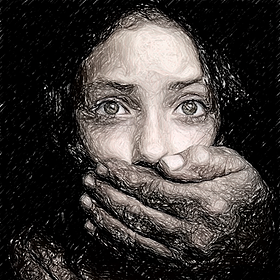Sexual violation of children is an ugly fact of life worldwide, crossing all cultural, educational and socio-economic boundaries. Within Canada’s overall population, research shows one in three girls and one in six boys experience an unwanted sexual act, with 30 to 40 per cent of victims abused by a family member. Research is beginning to show that child sexual abuse is a disturbing reality in many of Canada’s First Nations, Metis and Inuit communities. Extensive interviews with social scientists, indigenous leaders and victims undertaken over the past few months by The Canadian Press show that the prevalence of sexual abuse in some communities is shockingly high. And only now are prominent indigenous leaders speaking out publicly for the first time about the need for communities to take a hard look.
It’s a painful legacy connected to almost 120 years of government-sponsored, church-run residential schools, where aboriginal leaders say many native children were physically and sexually molested by clergy and other staff. The abused in turn became abusers, creating a cycle of childhood sexual violation that has spread in ever-expanding ripples from one generation to the next.
It’s a painful legacy connected to almost 120 years of government-sponsored, church-run residential schools…
Within indigenous society, the knowledge that children are being molested is often an open secret — but one to which few are willing to give voice. Instead, they dance around the words, talking instead about child welfare, bullying, substance abuse, inter-generational trauma and community conflict.

Links to substance abuse and the sex trade
Inter-generational sexual abuse is one key reason behind widespread substance abuse, a form of self-medication that helps both victims and perpetrators push down their emotional pain and bury their shame, health experts and Aboriginal leaders say. The abuse has gone beyond residential school survivors, their children and grandchildren, says Sen Murray Sinclair (chairman of the Truth and Reconciliation Commission). “We are looking now at a situation where inter-generational children are abusing each other,” he said. “Where members of street gangs are victimizing young girls, girls are going missing and being hauled into the sex trade in significant numbers.”
“The abuse has gone beyond residential school survivors, their children and grandchildren…We are looking now at a situation where inter-generational children are abusing each other”
The impact of childhood sexual abuse is expected to be a central issue raised when hearings begin early next year for the inquiry into missing and murdered Aboriginal women. Click here for the full article.
Free Yourself Global
This campaign explores the enculturation of violence through families over generations, and how does one, whether the abuser or the abused, interrupt the pattern of violence?
This for-profit campaign will contribute over half the proceeds directly to our affiliate organizations combating this pandemic and supporting victims and recovering abusers. We also aim to connect these groups to share resources, tools, ideas, and collaborate. Currently organizations from over 68 countries around the world have officiated their support of Free Yourself.
More importantly, this initiative hopes to bring together all of the voices of the participants of domestic violence, including recovering abusers, victims, children, educators, support agencies and health professionals, law enforcement agencies, politicians, celebrities and social entrepreneurs who work to aid in this cause. It is in this aim that “Free Yourself” inspires us. When all stakeholders come together in a grass roots forum, we strengthen our ability to understand, address, and end the cycle of domestic abuse.
